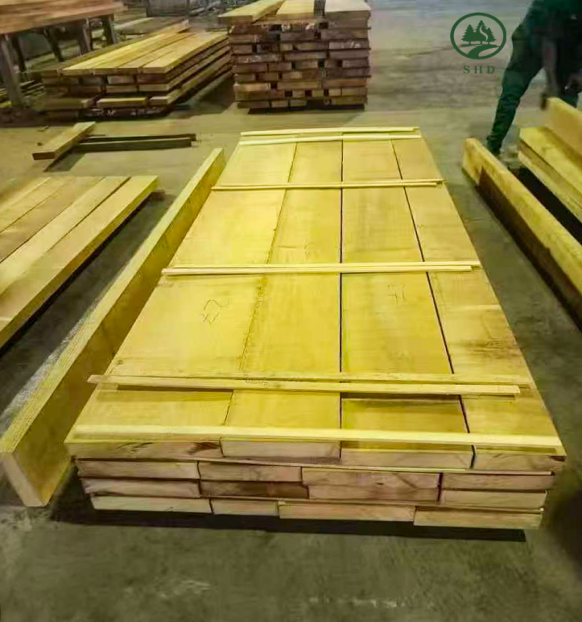Views: 231 Author: SENHEDA WOOD Publish Time: 2025-11-10 Origin: Site
Content Menu
● 1. IROKO
● 2. AFROMOSIA – KING OF AFRICAN TEAK
In September of this year, the SHD team visited markets and clients in Saudi Arabia, Turkey, and the UAE. We made some interesting observations, which we’d like to share here.
The Middle East market has a reasonable level of familiarity with African timber, primarily focusing on species such as IROKO, MOVINGUI, DABEMA, OKUME, SAPPELLI, BILLINGA, and KOSIPO. Among these, IROKO, MOVINGUI, and DABEMA were initially introduced to the market under the common name "African Teak." OKUME, on the other hand, was marketed as a substitute for Malaysian Meranti. When introducing a new timber species to a market, it’s a common practice to use a familiar name to attract customers. Interestingly, in the proforma invoices provided by clients, IROKO, AFROMOSIA, MOVINGUI, and DABEMA are all listed as "African Teak."


In the Middle East market, kiln-dried (KD) IROKO in lengths of 2.4 meters and above is preferred, with longer lengths being more desirable. This is because the furniture industry in the Middle East is not yet fully developed, and longer planks are needed for high-end custom products such as wardrobes, interior panels, doors, and stair railings. As a result, lengths below 2.4 meters have little demand in this market. Occasionally, some IROKO logs are processed in sawmills for specific dimensions. However, due to the limited number of drying facilities, the demand for air-dried (AD) lumber is also restricted.
IROKO’s texture and color are similar to teak, making it suitable for similar applications. The finished products have an excellent texture. However, IROKO from different regions often exhibits color variation. The polished kiln-dried board image below, provided by a Middle Eastern client, clearly shows this color difference. Preferences for color vary among clients—some prefer light yellow tones, while others favor darker brown shades. Another photo taken by the SHD team during a client visit shows custom-sized decking. The IROKO planks in the middle-right section, which have not undergone carbonization, show significant color variation. In contrast, the left section, which has been carbonized, exhibits much less color difference. The third image displays samples of the client’s decking. These examples demonstrate that the carbonization process can significantly reduce color variation, though it may not completely eliminate it.



This species is listed in the CITES directory, requiring CITES certificates for both import and export. AFROMOSIA is relatively concentrated in origin, primarily from northern Republic of Congo (RCONGO) and central Democratic Republic of Congo (DRC), with DRC-origin AFROMOSIA being of the highest quality. AFROMOSIA is an ideal substitute for Burmese teak. Unlike IROKO, it does not suffer from color variation. It is widely used and highly recognized in European, Vietnamese, and Chinese markets. When freshly cut, AFROMOSIA displays a beautiful golden-yellow color, but after oxidation over time, it eventually develops an elegant brown tone. Furniture and large boards made from AFROMOSIA will also eventually oxidize to this brown color.





The production of SIFOU-SIFOU in DRC and RCONGO is not very large. Similar to IROKO but without color variation issues, it serves as an excellent alternative to IROKO. Below are images of SIFOU-SIFOU from the central region of RCONGO.




This species is widely sourced and has a high level of recognition in Europe, China, and the Middle East. In China, it is primarily used for underfloor heating flooring and, more recently, for cutting boards. DABEMA has distinct characteristics: when freshly cut, it emits a pungent, unpleasant odor and is challenging to dry. After processing, the boards need to be air-dried for about 35 days before kiln-drying, which itself is a lengthy process. The drying process requires advanced technical expertise; otherwise, the loss rate can be high. It is also advisable to use the quarter-sawn cutting method during processing to reduce drying losses and ensure the strength of the finished wood. Although DABEMA is unstable during drying, it becomes highly stable after drying, and the pungent odor can be resolved. For this reason, several major flooring brands in China use this species for solid wood underfloor heating systems.


The above content reflects the SHD team’s understanding of these African timber species and is by no means exhaustive. As we continue our work, we will provide updates on the specific applications of various African timber species in different regions. We hope to contribute to the sustainable and high-value development of African timber.
-------Reported by MIKE ZHU.
Unveiling Mashonaste Wood: The Hidden Gem of South American Timber
Professional Q&A on African Movingui Wood - Hong Kong Senheda Wood Limited
Worry-Free Cross-Border Timber Procurement: Choose SENHEDA WOOD
Umbila: Value Analysis And Application Guide of A Rare African Hardwood
Wenge Has Become A Star Material in The Global Timber Market
Balsamo Wood: Nature’s Timeless Masterpiece for Luxury Craftsmanship